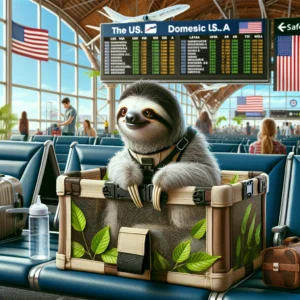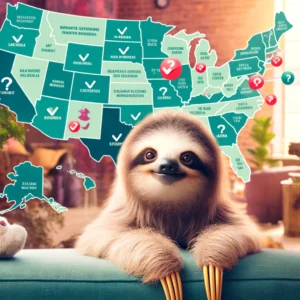Traveling internationally with a sloth involves a complex set of regulations and requirements that must be meticulously followed to ensure the safety and legality of the journey. This guide provides an in-depth look at the necessary preparations, including vital paperwork, to help you successfully navigate international travel with your sloth.
1. Understanding Sloths’ Specific Needs
Environmental and Dietary Considerations:
- Temperature Sensitivity: Sloths are native to tropical climates and require a warm environment, especially during transport.
- Stress Minimization: The travel environment should be calm and quiet to avoid causing stress, which can lead to health issues for sloths.
- Dietary Needs: Ensure access to fresh leaves and fruits, which are the staple of a sloth’s diet, throughout the journey.

2. Legal Paperwork and Documentation
Navigating the bureaucratic landscape is one of the most critical aspects of planning international travel with a sloth. Below is a comprehensive list of the necessary documents:
Essential Documents:
| Document | Description |
|---|---|
| CITES Permit | Required for all international travel as sloths are listed under the CITES appendix. |
| Veterinary Health Certificate | A document affirming the sloth’s health and fitness for travel, issued within 10 days of departure. |
| Export and Import Permits | Necessary permits from both the exporting and importing countries’ wildlife departments. |
| Proof of Legal Acquisition | Documents proving the sloth was obtained in compliance with all local and international laws. |
Additional Recommendations:
- Microchip Identification: A microchip is a recommended form of identification, providing a permanent ID for your sloth.
- Travel Itinerary: Detailed travel plans should be documented and presented if required by officials.
- Emergency Contacts: Contact information for veterinarians and wildlife experts in both the originating and destination countries.

3. Country-Specific Requirements
Each country may have its own specific regulations regarding the import and export of exotic animals. It is crucial to consult and comply with the national authorities of the involved countries. Here’s what generally needs to be checked:
Checkpoints:
- Quarantine Laws: Some countries require a quarantine period for imported exotic animals to prevent the spread of diseases.
- Wildlife Authority Clearance: In many cases, clearance from the national wildlife authorities is needed.
- Customs Duties and Taxes: Be aware of the potential customs fees and taxes that can be levied on exotic animals.
4. Preparing for the Journey
Carrier Specifications:
- Size and Ventilation: The carrier should be large enough for the sloth to move comfortably and must be well-ventilated.
- Temperature Control: Heating pads may be needed to maintain a stable temperature within the carrier.
Travel Day Checklist:
- Food and Water: Pack ample fresh food and water to last the duration of the journey.
- First-Aid Kit: Include basic first-aid supplies tailored to a sloth’s needs.
- Documentation: Carry all original documents with you and keep copies in a safe place.
5. At the Airport
Security and Handling:
- Early Arrival: Arrive at the airport early to navigate through customs and security smoothly.
- Inform Officers: Make sure that the security officers are aware they are handling a sloth, as they require gentle and careful handling.
In-Flight Care:
- Direct Flights: Opt for direct flights to reduce travel time and stress on your sloth.
- Cabin or Cargo: Confirm if your sloth can travel in the cabin; otherwise, ensure the cargo area is climate-controlled.
6. Post-Arrival Care
Upon arrival, it is essential to:
- Veterinary Inspection: Have a veterinarian inspect the sloth for any signs of stress or illness immediately.
- Acclimatization: Allow the sloth to gradually adjust to the new environment.
- Legal Follow-Up: Ensure all local regulations are followed to legalize the sloth’s status in the new country.
Top 20 Country-specific regulations due to their status
Traveling with sloths involves navigating complex and country-specific regulations due to their status as exotic and sometimes endangered animals. Below is an overview of the top 20 countries and their specific regulations for importing or traveling with a sloth. This guide highlights the need for CITES permits, health certifications, and other key documentation, focusing on the distinct requirements from country to country.
1. United States
- CITES Permit: Required for both import and export.
- USDA Permit: Needed for import.
- Health Certificate: Must be issued within 10 days prior to travel.
- Quarantine: Not typically required but subject to inspection.
2. Canada
- CITES Permit: Essential for import and re-export.
- CFIA Permit: Required for all exotic pets.
- Health Certificate: Canadian Food Inspection Agency must inspect and approve.
- Quarantine: Depends on the province and health status.
3. Australia
- CITES Permit: Mandatory.
- Import Permit: Required from the Department of Agriculture.
- Health Certificate: A government-approved vet must issue it.
- Quarantine: Minimum of 30 days required.
4. New Zealand
- CITES Permit: Necessary for import.
- MPI Permit: Ministry of Primary Industries must issue an import health standard.
- Health Certificate: Required.
- Quarantine: Mandatory quarantine for at least 30 days.
5. United Kingdom
- CITES Permit: Required for import and export.
- DEFRA License: Needed for importing exotic animals.
- Health Certificate: Must be vet-issued and compliant with EU standards.
- Quarantine: Not usually required but subject to inspection.
6. Germany
- CITES Permit: Essential for import.
- Health Certificate: Required, must comply with EU pet travel scheme.
- BfN Permit: Federal Agency for Nature Conservation approval needed.
7. France
- CITES Permit: Required.
- Health Certificate: Must comply with EU regulations.
- DDPP Permit: Departmental protection of populations permit required for exotic animals.
8. Brazil
- CITES Permit: Mandatory.
- IBAMA Permit: Required from the Brazilian Institute of Environment and Renewable Natural Resources.
- Health Certificate: Required.
- Quarantine: May be required depending on the state.
9. Mexico
- CITES Permit: Required.
- SENASICA Permit: Health permit from National Service of Health, Safety, and Agrifood Quality necessary.
- Health Certificate: Required, must be detailed.
10. South Africa
- CITES Permit: Required.
- State Veterinarian Permit: Required.
- Health Certificate: Necessary.
- Quarantine: May be required.
11. Japan
- CITES Permit: Required.
- Animal Quarantine Service (AQS) Permit: Needed before arrival.
- Health Certificate: Required.
- Quarantine: Required upon arrival.
12. South Korea
- CITES Permit: Mandatory.
- Animal and Plant Quarantine Agency Permit: Required.
- Health Certificate: Necessary, detailed.
- Quarantine: Required, duration varies.
13. India
- CITES Permit: Required.
- Wildlife Crime Control Bureau Clearance: Needed.
- Health Certificate: Required.
- Quarantine: May be required based on entry point.
14. Russia
- CITES Permit: Required.
- Veterinary Certificate: Must follow Russian veterinary law.
- Health Certificate: Required.
- Quarantine: Not typically required but subject to veterinary inspection.
15. Italy
- CITES Permit: Required.
- Health Certificate: Must be compliant with EU regulations.
- ASL Notification: Local health authority notification required.
16. Spain
- CITES Permit: Essential.
- Health Certificate: EU compliant necessary.
- Regional Government Permit: May be required depending on the autonomous community.
17. Netherlands
- CITES Permit: Required.
- Health Certificate: Must be EU compliant.
- NVWA Permit: Dutch Food and Consumer Product Safety Authority permit required.
18. Switzerland
- CITES Permit: Required.
- Federal Veterinary Office Permit: Necessary for exotic animals.
- Health Certificate: Required.
19. Sweden
- CITES Permit: Required.
- Swedish Board of Agriculture Permit: Required for exotic animals.
- Health Certificate: EU compliant necessary.
20. Norway
- CITES Permit: Necessary.
- Norwegian Environment Agency Permit: Required for exotic animals.
- Health Certificate: Must be EU compliant.
Summary
For each of these countries, the primary considerations are:
- CITES Permit: Almost universally required to ensure the trade does not threaten the survival of species like sloths.
- Health and Veterinary Certificates: Essential to prove the animal’s health status and fitness for travel.
- Quarantine Measures: Vary significantly between countries based on local laws and the risk of diseases.
When planning international travel with a sloth, always check the latest regulations from both the exporting and importing countries’ relevant authorities well in advance of your travel dates. This proactive approach will help avoid legal issues and ensure that the welfare of your sloth is maintained throughout your journey.
Conclusion
Traveling internationally with a sloth requires thorough preparation and attention to legal and biological needs. By adhering to the guidelines outlined in this article, you can ensure a safe and compliant journey for your exotic pet, minimizing stress for both you and the sloth. Always plan well in advance and stay informed about the latest regulations pertaining to exotic animal travel.

Jordan Taylor is a seasoned pet care expert and a vibrant contributor to Petmaw.com. With over a decade of experience in veterinary science, Jordan brings a wealth of knowledge and a deep passion for animals to every article. After earning a degree in Veterinary Medicine from the University of Alaska Anchorage, Jordan spent several years working in a busy veterinary clinic, where they honed their skills in pet nutrition, behavior, and wellness.
Jordan’s love for animals isn’t just professional; it’s a fundamental part of their life. Home is shared with three rescue Sloth, two cats, and a small flock of backyard chickens, each with their own rescue story and special place in Jordan’s heart. This personal connection to animals shines through in Jordan’s writing, making their advice not only expert but also empathetic and practical for pet owners.
At Petmaw.com, Jordan is dedicated to providing pet owners with the latest research, trends, and tips in pet care, from innovative feeding strategies to understanding the subtle signs of pet health issues. Whether you’re a seasoned pet owner or new to the pet parenting world, Jordan’s insights aim to enhance the well-being of pets and deepen the human-animal bond.
In their spare time, Jordan is an avid hiker, often found exploring the trails with their dogs. They also volunteer at local animal shelters, offering their expertise and helping animals in need find forever homes. Jordan’s commitment to animal welfare and passion for sharing knowledge makes them a cherished member of the Petmaw.com family and a trusted guide for our readers.





